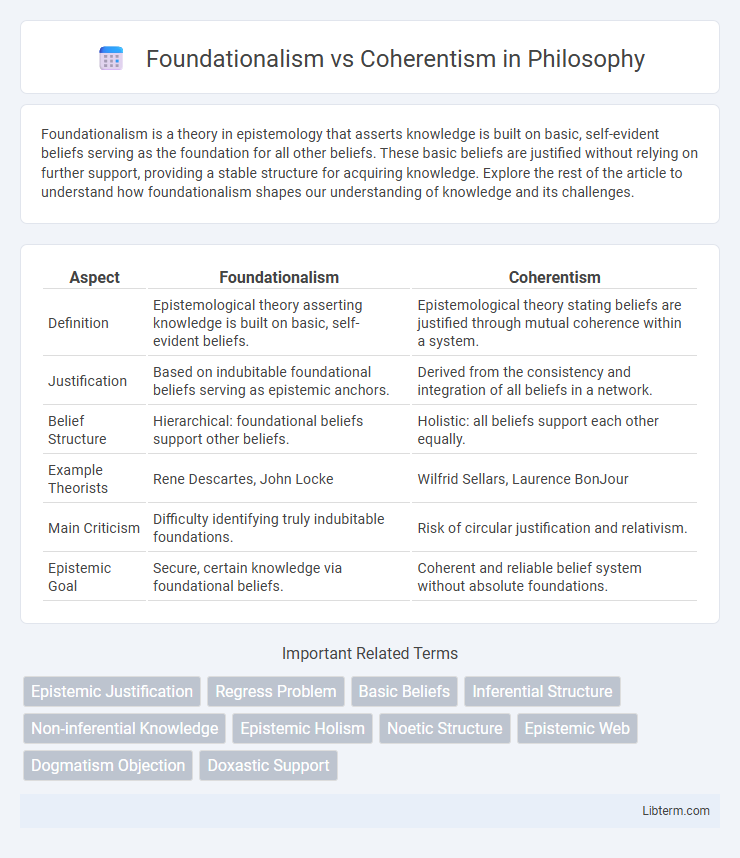Foundationalism is a theory in epistemology that asserts knowledge is built on basic, self-evident beliefs serving as the foundation for all other beliefs. These basic beliefs are justified without relying on further support, providing a stable structure for acquiring knowledge. Explore the rest of the article to understand how foundationalism shapes our understanding of knowledge and its challenges.
Table of Comparison
| Aspect | Foundationalism | Coherentism |
|---|---|---|
| Definition | Epistemological theory asserting knowledge is built on basic, self-evident beliefs. | Epistemological theory stating beliefs are justified through mutual coherence within a system. |
| Justification | Based on indubitable foundational beliefs serving as epistemic anchors. | Derived from the consistency and integration of all beliefs in a network. |
| Belief Structure | Hierarchical: foundational beliefs support other beliefs. | Holistic: all beliefs support each other equally. |
| Example Theorists | Rene Descartes, John Locke | Wilfrid Sellars, Laurence BonJour |
| Main Criticism | Difficulty identifying truly indubitable foundations. | Risk of circular justification and relativism. |
| Epistemic Goal | Secure, certain knowledge via foundational beliefs. | Coherent and reliable belief system without absolute foundations. |
Introduction to Epistemic Justification
Foundationalism posits that epistemic justification rests on basic beliefs that are self-evident, indubitable, or evident to the senses, serving as the secure foundation for all other knowledge. In contrast, coherentism argues that justification arises from the mutual support and coherence among a set of beliefs without requiring foundational beliefs. Both theories address the structure of epistemic justification, debating whether knowledge is grounded in isolated, secure beliefs or in the holistic consistency of the belief system.
Defining Foundationalism
Foundationalism asserts that knowledge is structured like a building, resting on basic, self-evident beliefs that do not derive justification from other beliefs. These foundational beliefs serve as the ultimate support for all other non-basic beliefs, ensuring a secure epistemic structure. This theory contrasts with coherentism by emphasizing the role of indubitable starting points rather than mutual support within a belief system.
Core Principles of Coherentism
Coherentism centers on the principle that beliefs are justified through their coherence with a system of interconnected beliefs rather than reliance on foundational, indubitable beliefs. This epistemological theory emphasizes mutual support among beliefs, where justification arises from the holistic compatibility and explanatory power within the entire belief network. Central to coherentism is the avoidance of epistemic foundationalism by rejecting the need for basic beliefs as ultimate justifiers, instead promoting a web-like structure where justification is distributed across the system.
Historical Background of the Debate
The historical debate between foundationalism and coherentism traces back to classical philosophy, with Descartes advocating foundationalism through his methodic doubt and the quest for indubitable beliefs. In contrast, coherentism gained prominence in the 20th century, influenced by philosophers like Otto Neurath and Laurence BonJour, emphasizing the mutual support among beliefs rather than isolated foundations. This epistemological dispute examines whether knowledge structures rest on basic beliefs or on the coherence within a web of beliefs.
Major Arguments for Foundationalism
Foundationalism asserts that knowledge is structured like a building, resting on basic, self-evident beliefs called foundational beliefs that do not require justification from other beliefs. These foundational beliefs provide a secure base to support inferential justification for other non-basic beliefs, ensuring epistemic certainty and preventing the problem of infinite regress. Major arguments emphasize the necessity of indubitable, infallible foundations to establish objective knowledge and maintain rational justification.
Major Arguments for Coherentism
Coherentism argues that beliefs are justified by their coherence within a system rather than by resting on foundational beliefs, challenging Foundationalism's reliance on indubitable basic beliefs. It emphasizes the mutual support and consistency among beliefs, positing that justification arises from the integration of all beliefs into a unified whole. Critics of Foundationalism point to the difficulty of identifying infallible foundational beliefs, making Coherentism a viable alternative for explaining epistemic justification.
Critiques and Counterarguments
Foundationalism faces critiques for its reliance on unquestionable basic beliefs, which critics argue can be arbitrary or unjustified, while coherentism is challenged for potential circularity and failing to connect beliefs to an objective reality. Foundationalists counter coherentist objections by emphasizing the necessity of firm epistemic foundations to prevent infinite regress, whereas coherentists argue that a holistic web of mutually supporting beliefs provides a more flexible and realistic account of justification. Both theories grapple with balancing the need for secure knowledge and adaptability to new evidence, prompting ongoing debates in epistemology regarding the nature and source of justification.
Practical Implications in Knowledge Theory
Foundationalism asserts that knowledge builds on indubitable basic beliefs, providing a clear structure for justified belief systems critical in scientific method development and legal reasoning. Coherentism, emphasizing interconnected belief networks, offers flexibility in adapting knowledge frameworks, which proves valuable in interdisciplinary research and moral philosophy where rigid foundations are less practical. Practical implications reveal foundationalism's strength in establishing certainty, while coherentism excels in accommodating evolving evidence and complex contexts.
Key Philosophers and Influential Works
Foundationalism, prominently advocated by Rene Descartes in "Meditations on First Philosophy," posits that knowledge is built upon indubitable basic beliefs or foundations. Coherentism, championed by philosophers like Laurence BonJour in "The Structure of Empirical Knowledge," argues that beliefs are justified by their coherence within a web of interconnected beliefs rather than foundational certainties. The debate between these epistemological theories centers on the structure of justification, with foundationalism emphasizing self-evident truths and coherentism highlighting systemic mutual support among beliefs.
Future Directions in Epistemology
Future directions in epistemology emphasize hybrid models that integrate Foundationalism's emphasis on basic, self-evident beliefs with Coherentism's stress on systemic justification within belief networks. Advances in cognitive science and artificial intelligence contribute to developing dynamic epistemic frameworks that adapt foundational beliefs through coherence-based updates. Emerging research explores how these integrative approaches can address challenges in epistemic justification, belief revision, and the reliability of knowledge formation processes.
Foundationalism Infographic

 libterm.com
libterm.com